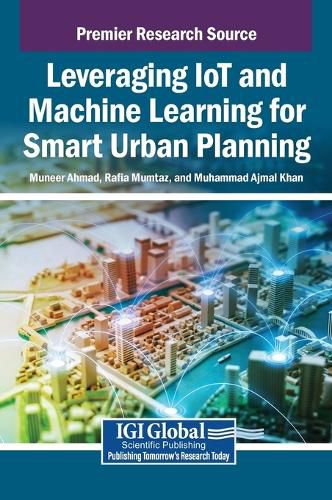Readings Newsletter
Become a Readings Member to make your shopping experience even easier.
Sign in or sign up for free!
You’re not far away from qualifying for FREE standard shipping within Australia
You’ve qualified for FREE standard shipping within Australia
The cart is loading…






This title is printed to order. This book may have been self-published. If so, we cannot guarantee the quality of the content. In the main most books will have gone through the editing process however some may not. We therefore suggest that you be aware of this before ordering this book. If in doubt check either the author or publisher’s details as we are unable to accept any returns unless they are faulty. Please contact us if you have any questions.
The integration of the Internet of Things (IoT) and machine learning (ML) transforms the way cities are planned, developed, and managed, creating a new era of smart urban planning. By connecting physical infrastructure with real-time data, IoT devices enable cities to collect and analyze large amounts of information on data like traffic patterns and energy usage to air quality and public services. When paired with the predictive capabilities of machine learning, this data can optimize urban systems, enhance sustainability, and improve residential quality of life. Smart urban planning powered by IoT and ML facilitates more efficient resource management while fostering greater resilience in the face of urban challenges, such as population growth, environmental pressures, and climate change. This innovative approach may help create cities that are smarter, more adaptive, and better equipped to meet future needs. Leveraging IoT and Machine Learning for Smart Urban Planning explores the integration of IoT and machine learning technologies to create smarter, more efficient, and sustainable environments. It covers theoretical foundations, practical applications, and real-world case studies across various sectors including urban planning, transportation, energy management, agriculture, healthcare, water resources, and waste management. This book covers topics such as citizen engagement, renewable energy, smart cities, and is a useful resource for policymakers, business owners, engineers, sociologists, academicians, researchers, and data scientists.
$9.00 standard shipping within Australia
FREE standard shipping within Australia for orders over $100.00
Express & International shipping calculated at checkout
This title is printed to order. This book may have been self-published. If so, we cannot guarantee the quality of the content. In the main most books will have gone through the editing process however some may not. We therefore suggest that you be aware of this before ordering this book. If in doubt check either the author or publisher’s details as we are unable to accept any returns unless they are faulty. Please contact us if you have any questions.
The integration of the Internet of Things (IoT) and machine learning (ML) transforms the way cities are planned, developed, and managed, creating a new era of smart urban planning. By connecting physical infrastructure with real-time data, IoT devices enable cities to collect and analyze large amounts of information on data like traffic patterns and energy usage to air quality and public services. When paired with the predictive capabilities of machine learning, this data can optimize urban systems, enhance sustainability, and improve residential quality of life. Smart urban planning powered by IoT and ML facilitates more efficient resource management while fostering greater resilience in the face of urban challenges, such as population growth, environmental pressures, and climate change. This innovative approach may help create cities that are smarter, more adaptive, and better equipped to meet future needs. Leveraging IoT and Machine Learning for Smart Urban Planning explores the integration of IoT and machine learning technologies to create smarter, more efficient, and sustainable environments. It covers theoretical foundations, practical applications, and real-world case studies across various sectors including urban planning, transportation, energy management, agriculture, healthcare, water resources, and waste management. This book covers topics such as citizen engagement, renewable energy, smart cities, and is a useful resource for policymakers, business owners, engineers, sociologists, academicians, researchers, and data scientists.